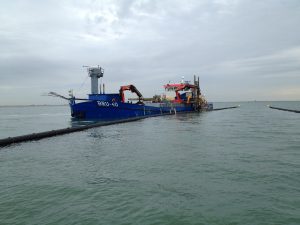
EasyFarm
What is EasyFarm?
EasyFarm is a complete and thoroughly developed system for the cultivation and harvesting of mussel seed, mussels and seaweed in the vertical water column. This system was developed in 2001 by a joint venture of Prins & Dingemanse, Murre Technologies and the TNO research centre. For Prins & Dingemanse as a mussel farming company it is essential that the availability of Dutch mussels is secured for the future. As an engineering works Murre Technologies focusses on the future of the international shellfish and crustacean sector. TNO has supported the two parties with biological expertise and research.
How is harvesting performed?
The harvesting machine has adjustable brush belts, which can be adjusted as required. It is possible to opt for a setting resulting in a clean net (which means that everything is harvested) or a setting whereby only the fully grown outer layer of (seed) mussels/seaweed is removed from the net. As this harvesting process is performed under water for the mussels, the mussels in the inner layer are not affected by the harvesting at all, so they can continue growing undisturbed in their natural environment until they have reached the required size. For the purpose of seed mussel cultivation this well thought-out method enables harvesting to be repeated once or twice per harvesting season (7 months).
How does the seed mussel capturing system work?
The basis of the system consists of a 100 metre long net (which can be 3 or 4 metres deep to your requirements), held in position by a so-called floater pipe. Both ends of the floater pipe are anchored to the seabed. The mussel larvae/seaweed attach to the net and then grow into seed mussels/seaweed there. When the seed mussels/seaweed have grown into mature seed mussels/seaweed, halfgrown mussels, mussels or seaweed fit for consumption, the harvesting can be performed using the harvesting machine especially developed by Murre Technologies.
Quadro arrangement
More than a decade has passed since the development of the concept in 2001 and during this period we have gained a lot of experience together with our partners. From this basis a quadro set-up was designed offering space to no fewer than 12 systems per hectare (contrasting sharply with the mere 3 systems operated during the single capturing system). Basically only 2 anchors are needed (instead of 8) for this quadro set-up, resulting in considerable cost savings, especially in terms of material and positioning. Obviously the cultivation yield is tested extensively, showing good results despite this clustering!

